Land use planning, land valuation focus of NA debate on draft revised Land Law
During the debate on the draft revised Land Law at the 15th National Assembly’s fifth session in Hanoi on June 21, land planning and land valuation were at the focus of attention.

Deputy Tran Dinh Gia from Ha Tinh said it is necessary to issue flexible mechanisms to assess the compatibility between land use planning (long-term) and land use plans (short-term); clarify the position, hierarchy and relationship of land use plannings with each other and with other plannings within the national planning system, as stipulated by the law.
Deputy To Van Tam from Kon Tum said the delay in the implementation of approved planning not only causes a waste of land resources and negative impacts on the socio-economic situation but also disrupts people’s lives. Therefore, he called for clear and feasible provisions in the revised Land Law to eliminate this situation.
Deputy Tran Thi Hien from Ha Nam suggested simplifying criteria and contents of land use plans at district level.
The principles and methods of land valuation were also among the issues of lawmakers’ concern.
Deputy Tran Van Khai from Ha Nam said the big gap between ground-rents, which arises from the conversion of land use purposes, specifically when land with low value is transformed into land with high value, implies unfairness in society. He cited as an example that agricultural land is often acquired and compensated at low prices before being converted into non-agricultural, residential, commercial or high-value service land whose prices are several times higher than agricultural land.
Therefore, he urged that the revised Land Law should address this unfairness, ensuring harmonious benefits for the State, investors and the people.
Regarding the valuation of land, deputy Phan Thi My Dung from Long An proposed that further research, review, supplementation should be conducted to ensure transparency in accordance with market principles to ensure a harmonious balance of interests between the State, land users, and investors when it comes to compensation for displaced people.
